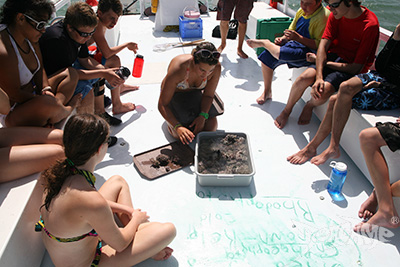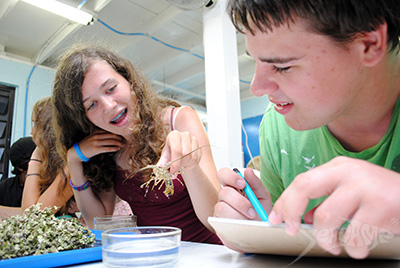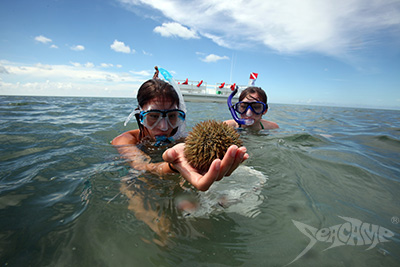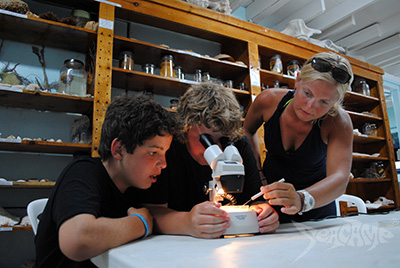Seacamp's Science Programs
Marine Science is Seacamp's primary focus. Our mission is to provide unique experiential education opportunities for campers who are genuinely interested in learning about the marine environment.

Our Marine Science program is designed to appeal to all campers at their own level of interest while learning important ecological principles that are pertinent to the future of our natural resources. The comprehensive program is coordinated into numerous 21-hour course offerings that campers select to create their program schedule. Guest speakers are brought in throughout the session to discuss their current research and environmental efforts.
All of our Marine Science programs include field study: labs, wading, kayaking, and boat trips. Boat trips take place on our triple-hull flattop boats and are snorkeling based. Classes are taught by instructors who have earned a 4 year degree in Marine Science, Oceanography, or a related field. Within each course there are correlated activities, providing unique interdisciplinary experiences for campers. Over 400 types of fish, coral, and algae found in our ecologically diverse waters provide opportunities for study.
Levels of Classes: Introductory, Intermediate, and Advanced Marine Science Courses are offered to satisfy varying levels of interest and understanding.
Each camper will fill out a course preference form that we send out a few weeks before camp starts. We use this to assign classes to campers based on preference, age, and how many years they have previously attended. This allows us to customize the experience for each camper. We cannot guarantee that the courses you select will be available but we will do our best to match your top choices on the preference form.
Introductory Marine Science Courses:
These courses are offered to campers of all ages who are interested in the sea, but may not have had previous opportunities to study marine science. The courses provide an introduction to the waters around the Florida Keys, and provide a good foundation to kick start a camper's natural curiosity. Here is a sample of our Introductory Marine Science courses:
Marine Communities: A study of the diversity of marine communities, such as sponge flats, sea grass meadows, mangrove ecosystems, and coral reefs. Emphasis is on the interdependent relationships between plants and animals living in these communities.
Exploration of the Seas: A broad survey course that exposes campers to many topics in marine biology, physical oceanography, and geology.
Keys Kritters: An overview of the many unique animals found on and around the Florida Keys. Focus is on the identification and natural history of animals indigenous to this area, including birds, reptiles, amphibians, fish, and invertebrates.

Intermediate Marine Science Courses:
These courses are again offered to all ages, however it is helpful for the camper to have had some previous knowledge of marine science. Here is a sample of our Intermediate level course offerings:
Marine Ecology: An examination of a variety of communities and a focus on how organisms interact with each other and their environment. Topics such as population density, predation, and other specific interactions will be explored.
Marine Adaptations: Explorations of what marine animals eat, their ability to change and utilize colors, and adaptations in behavior and structure for survival will be examined.
Marine Invertebrates: A survey of the major groups of animals without backbones that inhabit the marine environment. Visits to different communities will be conducted to study their taxonomy, morphology, behavior, and ecology.

Advanced Marine Science Courses:
These courses are best for highly motivated campers with a strong background and interest in marine science. In some cases, out-of-class study or free-time projects may be part of these courses.
Coral Reef Ecology: An examination of one of the world's most complex and diverse environments. Major emphasis will be on interrelationships between the reef and neighboring communities. Classes cover a broad range of subjects, including coral biology; the distribution of reefs; zonation within the reef and its causes; the origin, maintenance, and breakdown of reefs; and the human impact on reef areas.
Other Advanced courses include: Advanced Animal Behavior, Advanced Marine Invertebrates, Advanced Fisheries Science, Reef Fish Ecology, and Marine Field Techniques.
Seacamp science instructors realize the need for careful protection of our valuable natural resources. Wise conservation practices and a respect for the marine environment are at the core of the philosophy and actions of the Seacamp science program. All science activities include studies in the laboratory and in the field.
